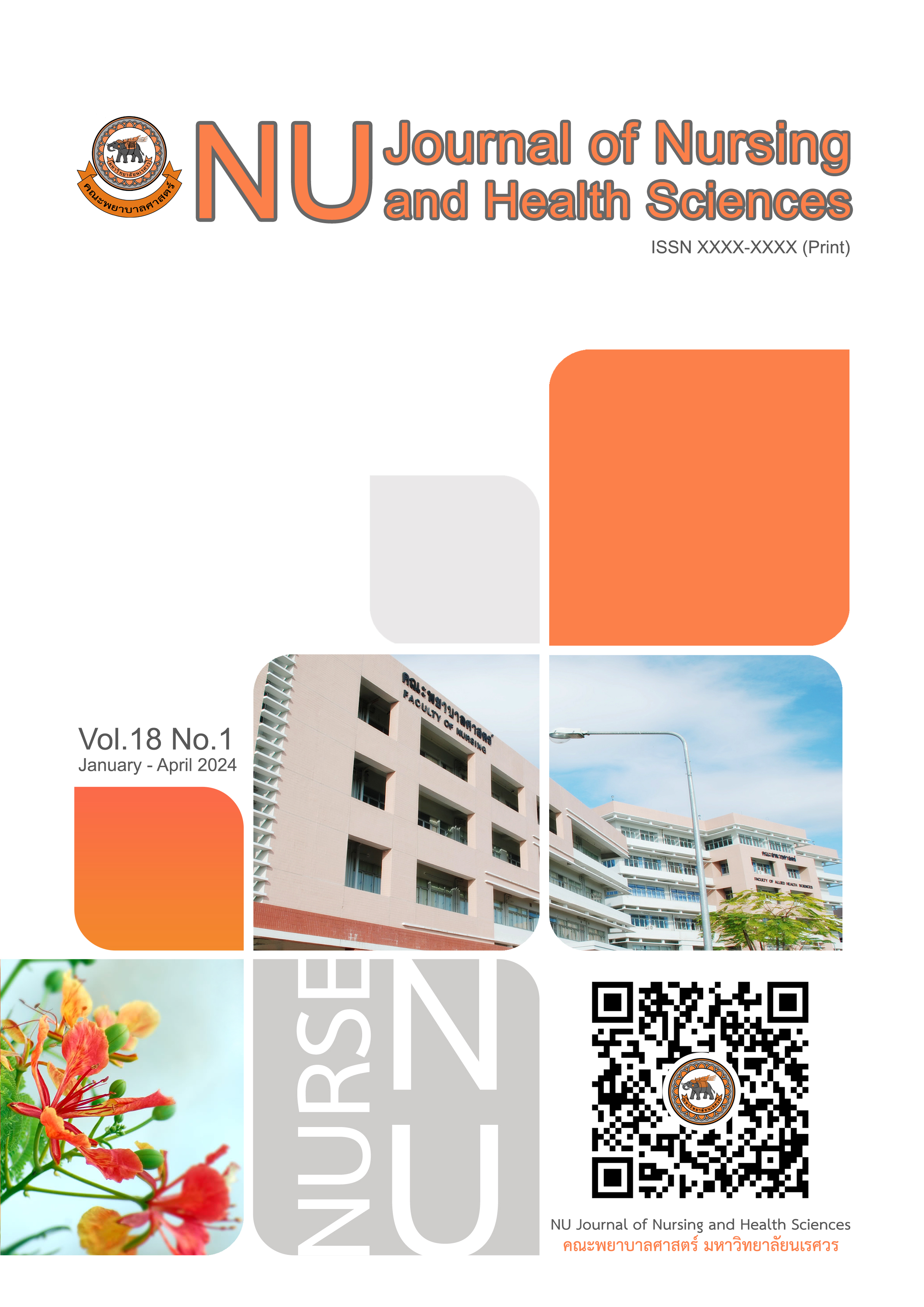ปัจจัยทำนายพฤติกรรมการจัดการตนเองของผู้ป่วยโรคปอดอุดกั้นเรื้อรังในยุคปกติถัดไป
Main Article Content
บทคัดย่อ
การศึกษานี้เป็นการวิจัยเชิงพรรณนาแบบความสัมพันธ์เชิงทำนาย (Predictive correlational Research) มีวัตถุประสงค์เพื่อศึกษาพฤติกรรมการจัดการตนเองของผู้ป่วยโรคปอดอุดกั้นเรื้อรังในยุคปกติถัดไปและเพื่อศึกษาปัจจัยทำนายพฤติกรรมการจัดการตนเองของผู้ป่วยโรคปอดอุดกั้นเรื้อรังในยุคปกติถัดไป กลุ่มตัวอย่างเป็นผู้ป่วยโรคปอดอุดกั้นเรื้อรัง ใช้วิธีการเลือกกลุ่มตัวอย่างแบบเจาะจง ขนาดกลุ่มตัวอย่าง 130 ราย เครื่องมือที่ใช้ในการวิจัย ได้แก่ แบบสอบถามพฤติกรรมการจัดการตนเอง ความรู้ การรับรู้สมรรถนะแห่งตน การสนับสนุนทางสังคม และความวิตกกังวล มีค่าดัชนีความตรงตามเนื้อหา (Content validity index, CVI) ของเครื่องมือดังกล่าวเท่ากับ 0.84, 0.96, 1, 0.92 และ 1 ตามลำดับ และมีค่าความเชื่อมั่นโดยแบบสอบถามความรู้ทดสอบโดยใช้สูตรคูเดอร์-ริชาร์ดสัน 20 ได้ค่าเท่ากับ 0.82 ส่วนแบบสอบถามพฤติกรรมการจัดการตนเอง การรับรู้สมรรถนะแห่งตน การสนับสนุนทางสังคม และความวิตกกังวล ทดสอบโดยใช้สูตรสัมประสิทธิ์แอลฟาของครอนบาค ได้ค่าเท่ากับ 0.83, 0.89, 0.93 และ 0.75 ตามลำดับวิเคราะห์ข้อมูลโดยใช้สถิติค่าความถี่ ร้อยละ ค่าเฉลี่ย ส่วนเบี่ยงเบนมาตรฐาน และสถิติการวิเคราะห์ถดถอยพหุคูณ ผลการวิจัยพบว่า1.กลุ่มตัวอย่างมีพฤติกรรมการจัดการตนเองโดยรวมอยู่ในระดับปานกลาง(x̄=3.10,S.D.=0.49)2.อายุ ความรู้ การสนับสนุุนทางสังคม และการรับรู้สมรรถนะแห่งตน สามารถร่วมทำนายพฤติกรรมการจัดการตนเองของผู้ป่วยโรคปอดอุดกั้นเรื้อรังในยุคปกติถัดไปได้ร้อยละ51.4อย่างมีนัยสำคัญทางสถิติ(R2=.514,p<.001)โดยพบว่า อายุสามารถทำนายพฤติกรรมการจัดการตนเองของผู้ป่วยโรคปอดอุดกั้นเรื้อรังในยุคปกติถัดไปได้มากที่สุด(β=.375,p<.001)รองลงมาคือ ความรู้ (β=.301,p<.001)การสนับสนุนทางสังคม(β=.156,p<.05) และการรับรู้สมรรถนะแห่งตน (β=.154,p<.05)ผลการศึกษานี้เสนอแนะว่าบุคลากรทางสุขภาพควรส่งเสริมให้ผู้ป่วยโรคปอดอุดกั้นเรื้อรังมีความรู้โดยเฉพาะด้านการรักษา ได้แก่ การออกกำลังกาย รวมถึงวิธีการผ่อนคลายและการจัดการกับความเครียด ส่งเสริมให้ผู้ป่วยได้รับการสนับสนุนทางสังคมที่ดีจากเพื่อน ครอบครัว ชุมชน และบุคลากรทางสุขภาพ ช่วยให้ผู้ป่วยได้เข้าถึงแหล่งสนับสนุนอย่างเหมาะสม นอกจากนั้นควรส่งเสริมให้ผู้ป่วยมีการรับรู้สมรรถนะแห่งตนในเรื่องการรับประทานอาหารที่เหมาะสมกับโรค ความถี่และระยะเวลาของการออกกำลังกาย และการใช้เทคนิคหายใจเพื่อลดอาการหอบเหนื่อยเพื่อช่วยให้ผู้ป่วยโรคปอดอุดกั้นเรื้อรังมีพฤ๖กรรมการจัดการตนเองอย่างเหมาะสมกับบริบทของยุคปกติถัดไป
Article Details

อนุญาตภายใต้เงื่อนไข Creative Commons Attribution-NonCommercial-NoDerivatives 4.0 International License.
เอกสารอ้างอิง
Bandura, A., & Wessels, S. (1994). Self-efficacy (Vol. 4, pp. 71-81). N.P.:n.p.
Banluesin, S., (2021). Review reports the impact of the COVID-19 outbreak on non-communicable diseases and global
related factors. Retrieved 7 June 2022, from http://thaincd.com/document/file/download/knowledge/Report_Impacts_of_COVID-19_on_NCDs_at_global_level_v5_final_by_editor_03.09.64.pdf. [In Thai].
Boonprasert, C., Panuthai, S. & Chintanawat, R. (2016). Effect of Hatha Yoga exercise on physical fitness among older persons. Nursing Journal, 43(supplement), 35-47. [In Thai].
Chanaman, P. (2017). A causal model of factors affecting self-management behavior among old-aged chronic obstructive pulmonary disease. Academic Journal of Mahasarakham Provincial Public Health Office, 1(2), 75-86. [In Thai].
Curley, C. (2022). Living with COPD during the COVID-19 pandemic: A phenomenological study. Master's thesis, University of Prince Edward Island, Island:
Danyuthasilpe, C. (2017). Promoting self-management for patient with chronic obstructive pulmonary disease. Journal of Nursing and Health Sciences, 11(2) (Special Issue), 97-104. [In Thai].
Division of Health Economics and Health Security. (2019, 28 January). Chronic obstructive pulmonary disease (COPD) Presentation]. Meeting to select topics for health problems and/or technology enter the assessment to develop a set of benefits under the National Health Security System, Nonthaburi, Thailand. [In Thai].
Division of Non-Communicable Diseases. (2021). Review report impact of COVID-19 to the chronic non-communicable disease service system. Retrieved 7 June 2022, from http://www.thaincd.com/2016/media-detail.php?id=14088&tid=&gid=1-015-005 [In Thai].
House, J.S. (1981). Work stress and social support. Philippines: Addison-Wesley.
Jaikum, P. (2019). Factors related to self-management behaviors of highlanders with chronic obstructive pulmonary disease. Master's thesis, Chiang Mai University. Chiangmai. [In Thai].
Kor-issaranuphab, N., Samrannet, W., & Arsa, P. (2022). Factors related to self–protective behaviors for Coronavirus Disease 2019 infection among type 2 diabetic patients. Journal of Sakon Nakhon Hospital, 25(1), 43-55.[In Thai].
Korpershoek, Y., Vervoort, S., Nijssen, L., Trappenburg, J., & Schuurmans, M. J. (2016). Factors influencing exacerbation-related self-management in patients with COPD: a qualitative study. International journal of chronic obstructive pulmonary disease, 11, 2977–2990.
Lorig, K. R., & Holman, H. R. (2003). Self-management education: history, definition, outcomes, and mechanisms. Annals of behavioral medicine, 26(1), 1-7.
Mcauley, H., Hadley, K., Elneima, O., Brightling, C. E., Evans, R. A., Steiner, M. C., … Greening, N. J. (2021). COPD in the time of COVID-19: an analysis of acute exacerbations and reported behavioural changes in patients with COPD. ERJ Open Research, 7(1), 1-8.
Park, S., & Kang, Y. (2017). Symptom experience, self-efficacy, depression, and medication adherence in patients with chronic obstructive pulmonary disease. Journal of Korean Clinical Nursing Research, 23(2), 170-178.
Posai, V., Suksatan, W., Choompunuch, B., Koontalay, A., Ounprasertsuk, J., & Sadang, J. M. (2021). Assessment of the health-promoting behaviors of hospitalized patients with non-communicable diseases during the second wave of COVID-19. Journal of Multidisciplinary Healthcare, 14, 2185-2194.
Reilly, C. C., Bristowe, K., Roach, A., Maddocks, M., & Higginson, I. J. (2022). “You can do it yourself and you can do it at your convenience”: internet accessibility and willingness of people with chronic breathlessness to use an internet-based breathlessness self-management intervention during the COVID-19 pandemic. ERJ Open Research, 8(1), 1-14.
Royal Institute. (2020). New normal. Retrieved 31 January 2021, from https://royalsociety.go.th [In Thai].
Teeoutid, W., Kunsongkeit, W. & Dungpaeng, S. (2019). Factor influencing self-management behaviors of sodium restriction among congestive heart failure patients. Journal of Boromarajonani College of Nursing, Bangkok, 35(1), 120-129. [In Thai].
Thanaboonpuang, P. (2022). Health care and quality of life for the older adults in next normal. Journal of Research for Health Improvement and Quality of Life, 2(1). 86-96. [In Thai].
Thato, R. (2018). Nursing research concepts to application (4th ed.). Bangkok: CU Press. [In Thai].
Thongsalab, J. (2017). Generalized anxiety disorder better yet with cognitive behavioral therapy. Journal of Boromarajonani College of Nursing, Surin, 7(1), 40–51. [In Thai].
Thoracic Society of Thailand under Royal Patronage. (2017). Clinical practice guideline for Chronic obstructive pulmonary disease 2017. Bangkok: Enterprise group company limited. [In Thai].
Thorndike, R. L. (1987). Stability of factor loadings. Personality and Individual Differences, 8(4), 585-586.
Ting, T. A. N. G., Bei, D. O. U., Hui-Xian, Z. H. A., Lian-Shan, T. A. O., Ze-Juan, G. U., Kou-Ying, L. I. U., & Wei-Ping, X. I. E. (2022). Factors related to activation in Chinese patients with chronic obstructive pulmonary disease: A cross-sectional survey study. Journal of Nursing Research, 30(3), 209.
World Health Organization. (2022). Chronic obstructive pulmonary disease (COPD). Retrieved May 20, 2022, from https://www.who.int/news-room/fact-sheets/detail/chronic-obstructive-pulmonary-disease-(copd).
Yadav, U. N., Lloyd, J., Hosseinzadeh, H., Baral, K. P., Bhatta, N., & Harris, M. F. (2020). Self-management practice, associated factors and its relationship with health literacy and patient activation among multi-morbid COPD patients from rural Nepal. BMC Public Health, 20(1), 1-7.
Yang, H., Wang, H., Du, L., Wang, Y., Wang, X., & Zhang, R. (2019). Disease knowledge and self-management behavior of COPD patients in China. Medicine, 98(8), 1-5.


